A Palestinian family mysteriously disintegrates while violence permeates the valley in which they reside.
Karim Kattan
Dawn is truly strange, isn’t it? Such a powerfully weird moment. Even amid grief, one feels hopeful at dawn, doesn’t one? It’s like a take-off. Mariam was happy to tell her guests whatever they wished to know. She wasn’t one for hiding. She never really understood the urge to do so. And now, anyway, what did she have to lose, she wondered, looking outside the kitchen window at the patio, shaded by the fig tree. Well, yes — there was the small matter of how their parents had died. Mariam realized this. It was eerie — upsetting, even — how similar it was. The brutish manner; one felt it was the work of someone who had no idea what they were doing. Surprising, this similarity. She’d be lying if she pretended otherwise; and she’d be lying if she didn’t say outright that she felt like she’d been punched in the gut when the police called her.
But these things — they happen, often. She’d heard somewhere, or perhaps read in the paper, that it was the leading cause of death in this region. Well, after getting shot in the head by a soldier, that is. But that’s another matter. Somehow, that felt habitual, less sinister.
Is the chair comfortable? Mariam is sorry, she didn’t expect them so early in the morning. Would they like some sage? She brews a pot every morning. You know, that’s why her parents called her Mariam because all her mother wanted to drink when she was pregnant was sage, maramiye. Isn’t that funny. She’s always felt very, she paused, fumbling for the word, connected to this herb. She misses her parents very much, especially now. Now she’s all alone. She’d never been so alone.
When Zar and Marta were still here — sure, there was a lot of noise, and Marta could fly off the handle at any moment, but at least it was — well, family, right? And in the evening, she’d pour sage in these little rusty cups and Zar would drink it silently and Marta would be too busy doing this and that and her tea would go cold and then Mariam would have to brew a new pot but Marta would end up never drinking it because she could never really just sit down and drink sage; that’s what she was like.
The sage is from the garden. Yes, of course, Mariam said, she can answer any question. She does not have anything to hide. She knows that everyone around town thought Zar was dumb. He was slow, he stuttered sometimes; and when he was excited (how odd, only then), he lisped a bit. He smiled easily, and only rarely showed anger. A sweet kid, a sweet sweet kid. He didn’t yell when someone cut in line in front of him at the baker. He waited patiently when person after person, at the pharmacy, squeezed past him, shoved him aside, even though he had been there for more than fifteen minutes. People felt this was an unforgivable sign of weakness. Mariam, however, disagreed. Zar was meek, perhaps. Yes, that’s the word, and isn’t that a quality, she asked. He drifts away sometimes, just like that.
Marta, on the other hand, didn’t think that Zar drifted. Marta thought that Zar was a good-for-nothing. She never said so, but she made it abundantly clear. (Mariam thought that Marta didn’t show it on purpose; she just loudly embodied everything Zar was not.) She would swoop in at the supermarket, as Zar waited, and she would cut the line, yelling and screaming, and drag Zar along with her. She’s — well, you know — she always knew what she wanted and what she thought was best for everyone and he’s … well – Mariam gestured with her hand, as if swatting flies away. He’s Zar, you know. Now, it’s not that they hated each other. They simply… well, I’d say they didn’t get along, yes. Something like that. Mariam pursed her lips regretfully.
Mariam had learned, early and fast, that to survive one needed to blur the borders of one’s knowledge. Pretend you don’t know; pretend you weren’t exactly there and didn’t have an opinion to begin with. She had learned this, as a child, when both her parents — and often Marta with them — would erupt like volcanoes and Zar was off somewhere in the woods. (To get to the woods, from here, was quite the walk. That he did it every day was a testament to Zar’s flashes of stubbornness.) For Mariam, it was easiest to stay still and never get involved. When she did intervene, it was in the most innocent of ways; with a voice like a massage to the temples, like a hush to the soul, a refreshing pedicure contained in a couple of syllables.
Mariam had consciously developed this voice. She had shaped it, through trial and error. Her natural voice was actually a monotone, much like Zar (but Zar’s monotone was disconcerting, it’s true, like a voice not quite human). She’d learned to modulate it into a reassuring shape.
Mariam thought of herself as a survivor. Zar and Marta, on the other hand, for all their differences, were not. And then there was the business of — you know. Of when Marta flew off the handle, that time, when it was really bad. Yes, that was something. Mariam supposed Zar knew it wasn’t Marta’s fault; that’s just the way she is, he said, she said, everyone said so. As if her very being was a howl. But he also never forgave her.
As for Zar, well, he was fanciful, you know. He saw things. Their parents, they were very nice, yes, they did the best they could, like all parents do, she said thoughtfully. All any parent can do is the best they can. Did you ever stop and think about how bad the world is, that humans must be parents? What if, for instance, we had another species, much better than ours, much more evolved, who could serve as the caregivers and guardians of children of humans until they came of age? You know? Everyone would be better adjusted, wouldn’t they? Mariam often thought of that; this was the fundamental flaw in society, that we had to rear our own.
She was sorry for the strong smell. Muskroot. It’s a smell she enjoys, she sprays some in every corner of the house each morning. It vivifies the air. Cleanses. That word, she relishes it: to cleanse. Yes. She enjoys the smell of muskroot but she knows people who don’t like it. She usually sprays it early in the day, as the smell will have evaporated by the time she greets her first guests. She didn’t expect them to arrive this early.
And yes, well — now, there’s no-one at home to drink the sage with her. But she has all her neighbors. Mariam enjoys a quiet life in her garden, but it’s nice to have habits shared with others. It created a sense of community, you know? And this town, this house of affliction (or was it figs? She never could remember where the name of the city came from), this valley of vice where they lived, where neither the bald-headed, smug consuls nor their servile assistants; neither the generals nor their minions dared step foot except to buy a woman or a cheap part for their cars, it could reveal itself to be quite welcoming sometimes. The neighbors took care of her. Not that she needed it, mind you, but it was nice nonetheless to be cared for, you know?
Anyway, what she thinks, most of all, was that it was extremely unfortunate that Zar was a man and Marta a woman. If it had been the other way around, Mariam feels, things would have gone differently. And she thinks they both knew it. They knew somehow, they had been switched right before birth, some sort of cosmic flaw, a bug if you will, had occurred. And sometimes, when Mariam thinks about it, she figures that this fieriness, this electricity, that Marta radiated was the resentment she felt that Zar somehow had taken her place. An usurper. This was the root of her violence.
Well, you know, Mariam feels like she has to insist on that, the guests would not understand otherwise. Violence, she said, again. You know where we live. It’s all around us. It’s in the air we breathe, it’s in our muscles. So, yes, naturally, our parents were, and Marta too and so was Zar sometimes and — well, she herself, Mariam, she was not beyond it, she did yell occasionally, why, in fact once she yelled at Marta so loudly you should have seen the look of surprise in her eyes, that shifted into fear, then outrage, yes, outrage that Mariam would yell at her; Marta she was like that, but she didn’t mean any wrong, she didn’t know (Marta, didn’t) what she wanted; you know she just did everything forcefully barely knowing what she was doing, and her whole life had been like a Band-Aid to her childhood. Yes, that’s right a Band-Aid to a childhood being born not a boy, and bowing her head when she walked by soldiers, and swallowing day in day out the intoxicating mix of shame, violence, fear, in front of these soldiers and —
My, she’s been blabbering for a while now. When she starts talking, it’s true, she doesn’t stop. Not only that but the more she talks, the less she feels like she makes sense; and then the next day, she feels very stupid, and so inarticulate. You know, she often thought about how pitch black the night was in these parts. Sure, the city folk had built all these roads leading into town, and had lined them with these great lamps. It was all very modern. So modern that it felt like it belonged to another country. (The highways! So clean, so infinite, a promise of eternity. Who has highways like that?) Anyway, the boys of the town had already started stealing the electric cables from the lamps, and sometimes climbed up to unscrew the bulbs and sell them on the market. And sure, the checkpoint at the entrance of the town beamed a searchlight which intruded on them all the time. Yet, the night remained pitch black. How this was possible, she could not say. Some sort of strange magic that protected, at night, the boys from the soldiers.
Mariam would like to insist on the fact that what the soldiers do is not arrest boys but abduct them. She hopes the guests don’t mind her being so emphatic about this, it’s important. It’s important also to understand she and Zar and Marta had grown up with the fear of being abducted by soldiers with high-tech weapons that shoot lasers in the night sky and taken somewhere where the searchlights and the floodlights never stop burning their eyes, drilling their souls. Anyway, she was saying how eerie it was, that all the night lights seemed self-contained: the soldiers’ searchlight could not dig into the solidity of night. The dark was of another essence than the light. And so, she’d taken the habit of spraying muskroot to greet the daylight and thank the night for its small graces.
There’s a nice breeze this morning. Mariam is available until ten, then she has some other guests who are supposed to come. Imm Nabil, her neighbor. This one, she comes daily. It’s awfully nice of her. Any other village or city here and she would have been shunned, she knows, for her work and the matter of her parents, and the matter of her brother and sister. Really just a run of bad luck; but other villages would have thought Mariam deserved it, that somehow it was all her fault. But not here. Here, there was a sort of safety. Anyway, Imm Nabil wouldn’t be here before ten. Mariam thinks the guests will really enjoy the shade of the fig tree, let’s sit outside for a bit.
A funny thing about Zar and Marta is that they both had a very peculiar relationship with this tree. Zar talked to it, in whispers, when he thought no one was watching (often, it was in the dead of night or just before daybreak). But Mariam saw everything. She spent her life seeing and attending to others, so yes, she heard Zar, that hulky, massive man, with his big biceps, his enormous, muscular back, his curly hair (some of it white; can you believe that the man she’s talking about is in his early forties? It feels like she’s talking about a teenager); that man, on all fours, whispering things in his sing-song voice, his slight lisp, to the fig tree. As for Marta, she hated the tree. She refused to eat its figs. When she was angry, she even threatened to have it felled. Felled!
Mariam had hoped, always, that both Marta and Zar could heal. Their wounds were so deep, so unfathomable; she thought that they themselves couldn’t understand them. Probably had no idea that they even had these wounds. They thought they were two warring continents but in fact they were just two gaping wounds unable to see or understand each other. Mariam knew they were both slightly crooked inside, and this crookedness gave them so much pain. You know, sometimes things are impossible to heal. How can one live without any hope like that?
The three of them, always on edge, always about to erupt. Well, Marta mostly. Zar was absent, and Mariam tried to smooth things over. In her good days, Marta was lovely — though self-involved. But on her bad days, she was so utterly terrifying — Mariam doesn’t even have words to describe it. And then, one day later, she’d be back to normal. As if nothing had happened. Mariam really believed that Marta forgot. She could say all this now, but back then. Well, Mariam had become sort of like those machines that can predict earthquakes, you know? She picked up on the slightest variation in Marta’s tone, any, microscopic edge; and she knew when it was time to hide.
There’s still some time before Imm Nabil comes. It’s getting a bit warmer, but it’s still delightfully cool under the fig tree. Ah, Zar had a peculiar relationship to time. He floated in it. Mariam thought it was easier when their parents were alive. Much easier, yes, because they seemed to organize their time, Zar’s time, especially; and they catalyzed Marta’s energy. When they died, Zar didn’t cry. He was a sensitive boy, he just didn’t know how to show it. So, obviously, here, people thought he was a stone-faced, cold-hearted madman. But Mariam knew that was not the case.
Marta, on the other hand, was devastated. She had spent her life in an ongoing conflict with them, yet their deaths had made her completely unravel. Yes, somehow, Mariam guessed, both of them unraveled after that. When did the relationship between Marta and Zar become venomous? She mused a little while. It happened overnight. Human lives are such mysteries. Probably after their parents’ death. Something went amiss; some secret equilibrium was disturbed for good.
But we live in such a venomous place, too, Mariam added. You know, we pretend it’s not a problem, we make believe that we’re fine with it and that we found ways to survive but really, seeing these soldiers, these rifles day in day out; this constant threat, it’s bound to make you go a bit mad. In this little corner — forgive me, it’s true — of an empire, really, how is one supposed to not be violent? You see the thing is, she’s been thinking about violence for a long time. And it seemed to her, now, that violence seeps into every single aspect of one’s life. Violence against the soldiers, but also against the house (some days she just wants to grab a pickaxe and hurl it at the stone walls), against the neighbors, the brother, the sister, against oneself. All of it is just one big web of violence, really, and one should be careful. Marta was like that, she had violence coiled up within her, ready to spring at any given moment. Even at its calmest, her voice carried the promise of storms. Zar, on the other hand, well, Mariam guessed his violence was a bit more insidious. Zar would target himself, his very soul, but no-one else. His outbursts would shred at his spirit. He told her once – she remembers that distinctly – that he sometimes felt like a hand was clenching at his chest, at his lungs, and he couldn’t breathe. She thinks that he said “sometimes” out of a sense of decency, but really, it was always.
It’s not like Mariam was innocent or naïve, not at all. You can’t survive here like that. No, but she knew where attention was wanted and where it wasn’t. She knew — her job taught her that — when to close her eyes and why. And she never second guessed herself or her intuition about those things. She’d learned it, over long and difficult years. You see her sitting here, pouring sage in these old cups, looking rather peaceful though, granted, a bit flustered, and you think she’s always been like this. But she has not. It required discipline; to squelch every burst of anger inside and every time she wanted to let loose and bang her head on the walls. Perhaps she was luckier than both Zar and Marta. There was something the gods had made crooked there. She doesn’t judge, it’s not her place. Besides, it wasn’t evil. It was a deep-seated inability to adapt.
She knew people tended to think of her as subservient. She wasn’t. She simply knew how to bend when needed. Marta and Zar, they couldn’t bend, they wouldn’t even know how to try. That’s why, eventually, they broke. Mariam was worried and upset often, too, of course; but she knew how to bide her time until the tides subsided. She knew how to wait for the calm to wash over.
Zar — she paused again. We shouldn’t make much of it. He was moonstruck, he lived in some dark, nocturnal cloud cuckoo land; someone who’d spend his days whispering things to a fig tree wouldn’t do that. Mariam thought that people read too much into Zar’s attitudes. She knew him best, and knew there was nothing sinister about him. He was soft, a lamb really, not a viper. Of course, lambs could kill, yes, they could. But not Zar.
Once she had been watching him, as he sat under the fig tree, right here, where they are sitting, the moon shining on just one half of his face and she thought to herself, she had never seen him truer to himself. Did she mention she thought he was properly moonstruck? She thought about that often, these days. When he was born, a wandering priest had come into the house and said the child had moons in his eyes. Of course, no one should believe wandering priests, especially not in these parts (and if they wander, it means that someone is allowing them to. Priests who are in cahoots with soldiers? That doesn’t sound too saintly to Mariam). But Zar did have them, she saw them often, these little dancing moons in his eyes. Sometimes they were beautiful, sometimes scary.
No, Zar would never do such a thing. Not her Zar. This she could tell the guests with absolutely certainty. Didn’t they think, that she wanted her sister’s murderer to be brought to justice? Yes, she did, though in this country, she was not sure what justice was worth. But what she knew, what she wanted to tell them, what she hoped she had shown them, what she truly believed, was that Eleazar didn’t do it.
The sound of water. Gurgling, free flowing, streams far and near. He crouched in the tall grass and closed his eyes. A complex system of canals, small, lush gardens, and bridges extended all around him. Up here on this cliff, far removed both from the town and the city. This is where they came to get water when the soldiers cut off the supply. This was the only place they had, all three of them, had genuine fun well into adulthood, laughing, dancing in the water, spraying each other.
Eleazar didn’t dislike his home, a town where the prostitutes, the thieves, the drug dealers, gathered and where their clients came to exploit them. It was no one’s fault that they lived in such a terrible place. It was a place that laid bare how deeply flawed the world was. A den of iniquity, it was called. That was true. Except that everyone else (the johns and the rich in their nearby villas who sometimes sent a bit of money, a bit of food, a bit of goodwill) made it iniquitous. It had seemed evident, to Eleazar, that the skies would always be dust-yellow and that always, he would live in that half-town, the garbage of a nation that never came to be. Mariam sometimes talked about venom but he thought, rather, that it was dust. Just dust, and trash.
Marta and Mariam called him “Zar.” Mariam said it with tenderness, Marta with something that sounded, sometimes, like scorn. They had called him Zar for so long that he felt he had lost his name. He was sitting cross-legged now, his back against a tree, and he whispered: “Eleazar.” His name, resonating in the hills, felt like a little song, a bit of night music. Something mystical about it; a grand name really, the name of one who survives; one who dies and is born again; and again; and again; and again. One who testifies to miracles.
Most people, he felt, lived with a kind of will to exist, a will to do. They lived forcefully. There was a rage in them. He had a hard time understanding how it did not exhaust them. He was born in a country that does not exist, in a city that itself is unstable, always quivering and on the verge of vanishing; and he was born — he saw that now — maladapted for the fight this implied. It had drained him of all will to enact change in the world around him. He had learned — from Mariam, mostly — how to leave the world alone, so that the world left him alone. It was tricky; it did not always work. Becoming a shadow, sometimes, was a gamble. But it had been his life.
Eleazar had thought, often and long, about life and death and had come the conclusion that some people deserved to die. They deserved to be put out of their misery. It was a noble gift to give, and to receive. He wondered what Mariam would think of that. Mariam was well-adjusted, happy. Or, at least, she could be happy. She will be happy. Marta, on the other hand, was exactly like him. She was filled to the brim with misery. Any more and she would have started spilling misery, like a liquid, out of her mouth. No court in a just world would ever hold against him that he did to Marta the thing that he had hoped, his whole life, someone would be brave enough to do to him.
He had decided to do it a long time ago. After their parents died. Years ago, when she went crazy for a day and a half. She was screaming, threatening to slit his throat like a pig. Her skin sallow and her eyes dark. It was all he could do not burst into tears at how pitiful she looked. And he had decided, then, that perhaps it was better for everyone, her included, to help her — well, get over life, really. That is all there is to it. He wondered why humans made such a big deal out of murder. What a very ugly word, too, that gave no justice to what he had done. There should be a new word for it, to differentiate this from that. The crime from the kindness.
The word for what he did was soft as a feather, and heavy like love. It was a bottle full of stars, a light kiss on someone’s forehead when they’re deeply asleep. It was the only act of real selflessness he had ever done in his life. It was an act so inexhaustibly kind, so beyond anything Eleazar ever thought himself capable of doing, that it made him dizzy.
Eleazar, mouth agape, looked at the trees that lined the banks of the little canals. It seemed to him that the quality of the air was different; it was charged differently, its texture made of atoms from another, better planet. And in the dead of night, the boughs were all aglow, pink and blue, as if a thousand magical fireflies had landed all along them and were dozing off.
From where he sat, he could also see the city lights dotting the horizon like some sort of magical painting. The city, so close to their town, yet a million miles away. And there, a million lives; some of them full of misery, others better adapted to this, all going about their evening activities.
What he learned today was that he loved Marta more fully, more beautifully, than he did Mariam. Because he had been able to give Marta what he could never give Mariam. A chunk of his life. He did not worry about Mariam, she would go on, drinking sage, cleaning the house, living modestly and comfortably off what was left of their parents’ inheritance — and his, and Marta’s — until they all became mere specks, memories of pain in old Mariam’s mind. We forget. It is the deepest gift that the gods gave us; to forget. She will forget them; perhaps senility one day, in some decades, will finally free her from the memory of her crooked, pained, siblings, and she will then be free.
He wonders, for a second, what the funeral was like. Just half a second, not more. The whole village must have attended and Mariam must have looked very dignified in black, standing all alone, abandoned by everyone in her family, everyone dead or vanished, just like that. The widow of an undead country. She must have smelled of muskroot, which she wore like a protection. He didn’t know if there was much of a body to bury but — he’d rather not think of that. It had been a hard task to accomplish, one he had forced himself, eyes wide shut, teeth clenched, to carry out until the end. Just like he had, a few years prior and — no, really, there was no use to think of that. Acts of selflessness. He deserved some peace of mind now. He owed it to himself.
He had a garden, pink and blue at night, to tend to. He had at least that. There was solace there. Marta, she had had nothing inside. Her soul (he knew! he knew it, and when she looked at him with eyes dark and full of the fury, he understood what she was asking him to do, and Mariam was too innocent to ever understand him and Marta), her soul was a desert, a very ugly, barren desert and perhaps in another world, some other universe, she would have been able to tend that desert, to make it a pretty little place, but she could not and all he did was help her. All he did was carry out what she had asked him to. It had been, he reflected, her last cruelty, to ask him to carry this weight for her.
The city, far away and below, glittered invitingly. And behind him, the town was in darkness (the residents had, recently, taken to stealing the street lamps; it felt like a joke, the ultimate snub to the city folk who arrogantly thought they’d bring them light). Somewhere there was Mariam, happily alone (though she did not know it yet; though she thought she missed him and Marta), going about her nightly chores before bed. There was Mariam, in quietude; there was serene Mariam. Soon he would vanish for good; and Mariam, once grief had subsided, would grow more peaceful.
The muscular hand, which had clenched at his lungs ever since he could remember, let go. He breathed in. The air was new. This was the most precious part of his soul, and here he was free.



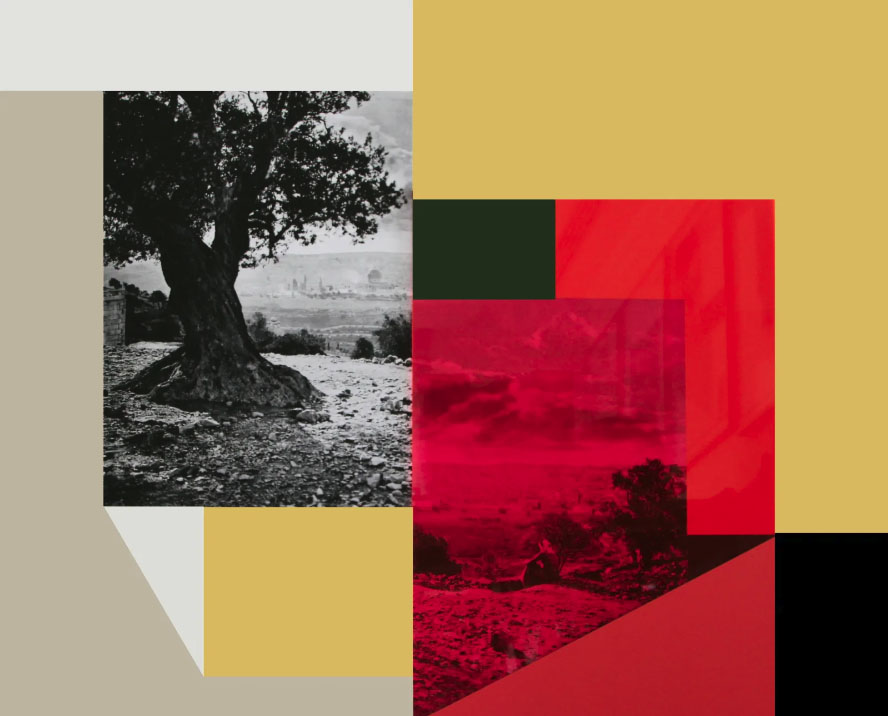







































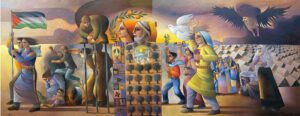













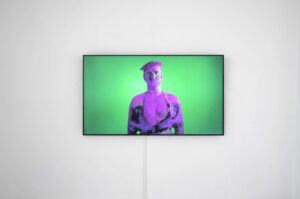

























![Fady Joudah’s <em>[…]</em> Dares Us to Listen to Palestinian Words—and Silences](https://themarkaz.org/wp-content/uploads/2024/03/SAMAH-SHIHADI-DAIR-AL-QASSI-charcoal-on-paper-100x60-cm-2023-courtesy-Tabari-Artspace-300x180.jpg)













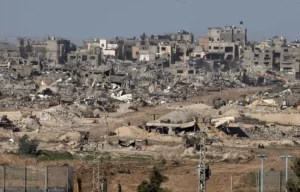



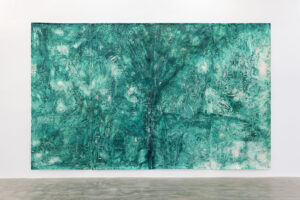



























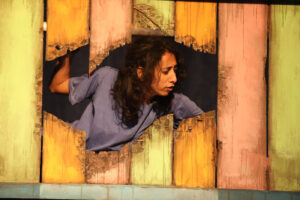








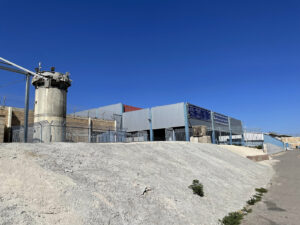





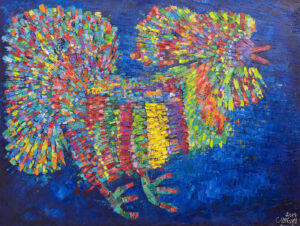












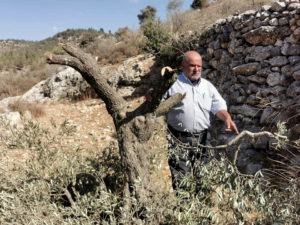













I loved this story, it was heartbreaking. I really enjoyed understanding the relationship between the siblings, which was rendered so beautifully and with emotional accuracy. I’d never thought of killing someone in this way, as an act of mercy, kindness, selflessness. The sole act of agency from a boy who never raised his voice. It will stay with me. As will drinking sage tea from rusted cups and the smell muskroot…..